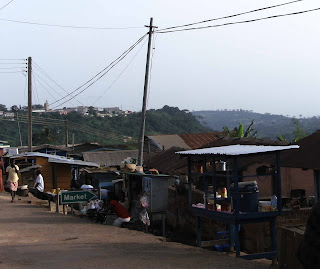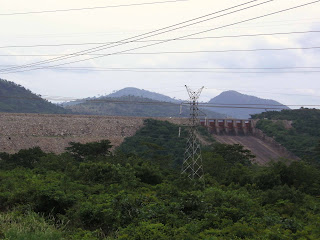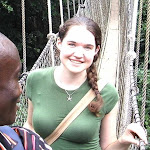I’ve been meaning to update this blog for a little while now, and in fact uploaded photos last weekend, just haven’t actually managed to write out the thoughts that match them- attending a naming ceremony – also known as an “outdooring” – World Cup hype, the horror that was Suarez’s handball, and my sheer, uninhibited joy at finding myself the recipient of a tweet from Vivek Oberoi, an insanely popular Bollywood actor (and, if that means nothing to you, boyfriend of Aishwarya Rai before she married the amazing Abhishek Bachchan… look them up. You’ll recognize her, if nothing else).
…but none of this is going to happen at the moment, so I apologize for the continued delay. At the moment, you can chalk this up to the fact that it’s half time of the final World Cup gaming, and, more realistically, you can chalk it up to the fact that I’ve been rather busy and quite distracted…. Partially by the subject of the below. Explanation: this blog partially owes its existence to a requirement for a grant I’ve garnered from Dickinson to wend my way here, and another aspect of this grant includes reflecting on the experience… ie through considering an “ethical issue” that’s presented itself in the workplace. Verbose, I know… blame the topic.
-------------------------------------------------------
In the first week of my internship, one of my coworkers approached my desk, asked how I was enjoying my stay in Ghana thus far, and informed me, smiling good naturedly, that he was going to call me “obroni,” or “white person/foreigner” in the local language of Twi. Less than a week later, as I visited schools in the area with some of the company’s sales team, children crowded around me in awe and pushed one another aside to get closer to me, touching me as if to be sure I was real, while their principals and school directors joked with my coworker that he should leave “his obroni” there with them.
Unlike the “politically correct” culture of the United States, in Ghana, race is acknowledged openly, and “obroni” has become my second name…. well, third, after my acquired Ghanaian name, Yaa (of Ashanti origin, meaning I was born on a Thursday). I have, in this light, become accustomed to it as such, knowing that it is meant more endearingly than otherwise, this labeling of me by my skin color in a country where foreigners such as myself are a rarity and a novelty. Ogling, compliments, flirtation, winks, air-blown kisses, declarations of love, and marriage proposals are to be expected pretty much any time I’m in a public setting.
This is, of course, something I’ve had no choice but to attempt to become accustomed to over my nearly two month stay here thus far; it began as surprising, steadily became more entertaining than surprising, with a twinge of annoyance, which ultimately grew to outweigh the “entertaining” factor, and has at this point become more exasperating than anything else. Here we have the constant pendulum between being ogled (by Ghanaians and other nationals alike it seems, unfortunately) and feeling invisible in a country that lists English as an official language more for administration purposes than as a matter of daily use. C’est la vie, the ups and downs of being a young, single white (American) woman in Ghana.
Thus, knowing that it is the norm, I didn’t allow myself to become truly upset until it became an unavoidable topic with one coworker in particular. With the permission of my supervisor and host, Mr. Agyare, this coworker, Franklin, one Saturday accompanied me on a trip four hours down the coast, being a native of that city; during that trip, we at one point came into conversation about inter-racial relationships and general racial outlook (after his having witnessed the unavoidable ogling and flirtation headed my direction). Looking upon us as friends more than coworkers, I thoughtlessly failed to anticipate the effect such a conversation could have down the road.
About a week later, he sent me an email – though purely intended to be friendly and complimentary, quite frankly, it frustrated me more than anything else. In this email, he expressed surprise and praise at my being both light skinned and “down to earth”… and, implied from our previous conversations and what he’d learned of me, this “down to earth” quality including the fact that I, though Caucasian, do not consider myself superior to others and act accordingly. This, apparently, made him so “humbled” that he had a hard time expressing it in person.
In Ghana, you see – as in much if not all of Africa – colonialism has left an indelible mark, and in more than the foreboding castles and former slave holds that still stand along the coast. More specifically and frankly, Ghanaians still see Caucasians – “obronis” – as superior to themselves, and they don’t pretend or act otherwise. Thus Franklin’s surprise to find me so frustrated by this mentality and so insistent that we are equals, and thus my coworkers and other Ghanaian acquaintances have been entertained, impressed, and slightly thrown off by my mode of partaking in everyday life, from street food to offering to help in a society that maintains class stratification in the form of hard laborers, street hawkers, drivers, cooks and maids, and general live-in house helps.
Though Franklin’s expression of praise and humility was meant to compliment, it frustrated me more than anything else. If a Ghanaian I’d truly spoken with and spent time with, had discussed this matter of racial outlook with, still viewed me first and foremost as a “light skinned lady” and humbled himself for any reason in connection to my skin tone, then who could I reach? Who in this country would see past color and realize that they are not inferior? After much agonizing, I carefully responded to his email, thanking him for the compliment but focusing my response on the fact that he had no reason to be humbled, repetition of the fact that we are equals and the insistence that, if I were to be complimented for anything, it should have nothing to do with my skin color. Still frustrated, I discussed the matter with the fellow Dickinsonian I am now staying with and discussed it with a couple of close friends at home (none of whom are Caucasian and all of whom have different backgrounds – both in terms of race and experience).
When I next saw Franklin in work, he warmly approached me, seemingly quite happy with the outcome. I, however, was, unfortunately, in a different mindset. Rather than feeling more comforted, as he seemed to, I was uncomfortable. I’d reached the tipping point. This pendulum between ogling and invisibility had hit home on too many fronts, and I was disappointed by the idea that even those who knew me (though to a limited extent, of course) still saw me through a painfully tainted light. What’s more, I was disappointed and frustrated by the idea that I was powerless to prevent it, as had been pointed out in the previous discussion with my close Ghanaian friend and fellow Dickinsonian.
At this point in time, I suppose the issue is as “resolved” as its going to be, but truly, it will never fully be resolved. How does one resolve such a thing? How can one beat into the minds of millions of people worldwide that we are equals – both for those who consider themselves inferior and for those who consider themselves superior? If only I knew the answer. Unlike some others, I cannot allow myself to become complacent in the matter; even knowing I can’t change the world, I can’t just “let it go,” though perhaps I should. Elie Wiesel once wrote “A mute conscience is a false conscience,” and I can’t help but note that if everyone were complacent, shaking our heads and saying “That’s just how things are,” nothing would ever change. No, I can’t change the world, but I can’t sit idly by as people wrongly belittle themselves, either.
Honestly, I have yet to regret my response to that particular situation with Franklin; I can’t think of anything I may have done differently. Knowing myself, I will continue discussing and thinking over the issue, and perhaps someday in the future, some time after my leaving Ghana, something else will occur to me, something I should have done or said instead. Perhaps, for instance, because he is a coworker, I should not have allowed for the opinion/ethics based conversation we engaged in regarding race. In this case, however, I still can’t help feeling that it was a matter of person-to-person, making the circumstances – work, friend, or family – more irrelevant than otherwise.
As for how I came to decide what constituted “ethical behavior,” in this case, I’d like to consider it common sense, though it flies in the face of what many still hold true (even in the US, a country that prides itself on the idea that all are equal). There is no question in my mind that skin color has (or rather, should have) no affect whatsoever on matters of “superiority” or “inferiority.” Even calling into the conversation the continued poverty of most Africans, and thus the difficulty in considering themselves equals with “obronis,” most of whom at least seem to be much better off than themselves, I must assert that we are, at root, equals – born into drastically different circumstances and opportunities, for better or worse, but equals.
How should others come to this conclusion? Well, as I said, I consider it common sense. Also as previously noted, however, this is, unfortunately, not the case, and I, unfortunately, do not yet have the answer. Teachings from the earliest ages, observing progressively more tolerant elders (eventually), experience in the world and exposure to those of different backgrounds and races, together with an open mind and, ideally, a genuine interest in humanity for what it is and a will to see the fulfillment of others’ rights and potential…. All of this, and more, is necessary. As is, quite frankly, both noting the problem where it exists and refusing to fall into a mindset of complacency or resigned fatalism.
To borrow from a favorite author and an Auschwitz survivor, Elie Wiesel: “Be the conscience of your nation. And remember, a conscience that does not speak up when injustices are being committed is betraying itself. A mute conscience is a false conscience.”
























